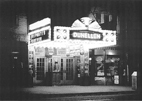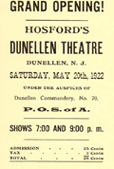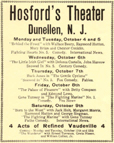HISTORY OF
THE DUNELLEN THEATER
Parties representing movie interests came to Dunellen, New Jersey in November of 1910, to see if the area could support an attraction of this kind. The promoters tried to lease the western store of the Linke building, 380 North Avenue, but couldn’t come to terms with the owners.
A year later, J.G. Wolfe of Scotch Plains, N.J. decided to open a theater at this same location. By December, 1911, Dunellen had its first movie at a 10 cent admission price. In four months, business declined and the doors closed April 13, 1912. Wolfe opened up again in May, featuring a different picture every night, but had to close up for good by June 1st.
Shortly after its first anniversary, the theater was renovated and in January, 1915, Eckerson purchased the Dunellen Theater from Heatherington. However, he soon left for a more lucrative operation and without him, attendance dwindled and operation ceased in early 1915.
The theater was then secured by Messrs. Hilsizer and Hamilton, of the Palace Theater in Bound Brook, N.J. They opened on Memorial Day, 1915. By the 24th of July, the proprietors gave up.
A new team, Messrs. Blau and Shearer, took over that same month and also failed to run a profitable business. Now it was the Elite Traveling Motion Picture Company’s turn. They opened on September 24th of the same year and closed shortly afterward. In October, the theater was again reopened by Fred Dougherty of Dumont, N.J., with the same unfortunate results. Harry Siegel of Elizabeth, started putting on one show a week in April, 1916, but in June, another purchaser took over. It was the Robinson Amusement Company of Trenton, that had great plans, but in September of 1916, the theater was still closed.
In August of 1916, Arthur F. Heatherington was again the owner of the Dunellen Theater. The building remained idle and in disrepair until November of 1918, when the Van Blaricom Lace Company purchased it and moved there.
The novel “Moviola,” published in 1980, depicts the life and times of a fictitious early movie mogul named B.J. Farber, who began his rise with a dry goods store in Dunellen, where he showed movies in the store after business hours. From this modest beginning, he developed a chain of nickelodeons and eventually became the owner of a major fictional movie studio.
In November, 1927, Meyer Cohen, of the Brook Theater in Bound Brook, purchased the Hosford Theater and ran a contest among local residents to find a name for his new enterprise. The winning name was “Dunellen’s Cameo Theater.” The local theater was incorporated in February, 1928, with an authorized capital of $15,000. On February 14, 1930, the Cameo Theater, again under new management, reopened with the new “talking equipment.”
M.H. Miller became owner-manager of the renamed Dunellen Theater in 1932 and made an effort to persuade the Borough officials to allow Sunday movies. The Dunellen Theater was reopened March 31, 1933 by Morris Marks, formerly with the Reade chain. RCA photophone equipment was installed and admission prices were 10 cents in the afternoon and 15 cents at night, children 10 cents at all times.
John Fiorvanti owned the theater for the longest term, 33 years. Ned and Rick Luca were the owners from 1963 to 1983, when it became the property of the Roberts Theater chain. A group of Indian businessmen took over the theater for a majority of the eighties. Under this management, the theater fell into disrepair and reached the point where it only exhibited Indian films. The operators proposed a plan to raise the historic building and construct a new Indian Cultural Center.
Current owner Richard Zupko, whose adjoining eponymous tavern has been under his family’s ownership for years, grew up—as had so many other area residents, attending the theater. Determined to save the theater from the wrecking ball, Zupko purchased the Dunellen Theater in 1989, cleaned up the facility and, combined with his tavern, began making plans to renovate and restore the theater and explore using it for alternative entertainment offerings.
These plans lay mostly dormant for the better part of a decade until February, 2001, when Zupko formed a partnership with area theatre veteran Ken Schwarz, dedicated to scheduling full seasons of live theatre and events, as well as continuing to exhibit movies; thus insuring that the Dunellen Theater’s colorful history will continue to be written.
click any image to see larger
Dunellen Theatre
circa 1936

•• Prices/Subscriptions •• Mailing List •• Donations •• Volunteer Info ••
•• Scrapbook of Past Productions •• Profiles •• Contact/e-mails •• Directions •• Home ••
Call 1-908-769-5799
for information
| Auditions |
Ken Schwarz, Founding Artistic Director
KenatMontrose@aol.com
908-769-5799
A 501(c)(3) NON- PROFIT CORPORATION
site produced by:
Assisted Web Development


